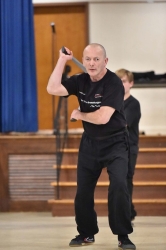
Okay, then I would say it is time to get back to one of my foundational arts. The title might be a little over the top, but you Gotta Love the buildup
Dekiti Tirsia Saradas Kali is a Filipino martial art that has captivated practitioners worldwide with its blend of practicality, effectiveness, and deep cultural heritage. Rooted in the ancient fighting systems of the Philippines, Dekiti Tirsia Saradas has flourished globally through a combination of structured teaching methods, international seminars, dedicated practitioners, and the adaptability of its techniques to various combat scenarios.
Origins and Fundamentals
Dekiti Tirsia Siradas Kali is one of the many styles within the broader umbrella of Filipino Martial Arts (FMA). It was developed by the forefathers of Grandmaster Jerson “Nene” Tortal Sr., Balbino, his father, Coronado, his Uncle, Sergondito, his grandfather, and Norberto his great grandfather, who in 1850 distilled his extensive knowledge of traditional Filipino fighting techniques into this distinct system. DTSK emphasizes close-quarter combat, incorporating techniques using sticks, knives, and empty-hand tactics. Its principles are based on natural body mechanics, efficiency of movement, and the strategic targeting of vital points on an opponent’s body.
Teaching Methodology
Structured Curriculum
The teaching of Dekiti Tirsia Saradas is characterized by a structured curriculum that progressively builds a practitioner’s skills. Beginners start with basic footwork, stances, and striking patterns using single sticks. As they advance, they learn double stick techniques, bladed and blunt weapon fighting, and empty-hand applications. The curriculum is designed to ensure that students develop a strong foundation before moving on to more complex techniques.
Drills and Sparring
A key component of Dekiti Tirsia Sarada’s training is the use of drills and sparring to simulate real combat scenarios. Tapping a multi-level progression, helps practitioners develop muscle memory and reflexes. Controlled sparring sessions allow students to apply their skills in a dynamic environment, honing their ability to adapt and respond to unpredictable attacks.
Global Dissemination
International Seminars and Workshops
One of the primary ways Dekiti Tirsia Saradas has spread globally is through international seminars and workshops conducted by Grandmaster Nene Tortal, his son, and other high-ranking instructors. These events attract martial artists from various backgrounds who are eager to learn the intricacies of DTSK. The seminars provide intensive training, covering fundamental techniques, advanced applications, and the philosophical underpinnings of the art.
Affiliate Schools and Instructors
Another crucial factor in the global growth of Dekiti Tirsia Saradas is the establishment of affiliate schools and certified instructors worldwide. These schools adhere to the standards set by Grandmaster Tortal, ensuring that the quality and authenticity of DTSK instruction are maintained. Certified instructors undergo rigorous training and evaluation to earn their teaching credentials, and they play a pivotal role in spreading Dekiti Tirsia Saradas in their respective regions.
Adaptability and Integration
Complementary to Other Martial Arts
Dekiti Tirsia Saradas’s techniques are highly adaptable and can complement other martial arts styles. Many practitioners of other traditional martial arts incorporate Dekiti Tirsia Saradastechniques into their training to enhance their self-defense capabilities. The principles of Dekiti Tirsia Saradas, such as fluid motion, direct, and indirect attacks, and effective counters, can be seamlessly integrated into various martial arts systems.
Law Enforcement and Military Training
The practical nature of Dekiti Tirsia Saradas has made it a popular choice for law enforcement and military training throughout the world. Its focus on weapon defense, close-quarters combat, and disarming techniques makes it highly relevant for real-world applications. Many law enforcement agencies and military units around the world have incorporated Dekiti Tirsia Saradas into their defensive tactics training programs.
Cultural Exchange and Preservation
Promoting Filipino Heritage
Dekiti Tirsia Saradas not only promotes effective self-defense techniques but also serves as a means of preserving and promoting Filipino culture. The art is deeply rooted in the traditions and history of the Philippines, and its practice helps to keep these cultural elements alive. Practitioners, wherever they are from gain an appreciation for Filipino history and values through their training in Dekiti Tirsia Saradas
Community Building
The global Dekiti Tirsia Saradas community is characterized by a strong sense of camaraderie and mutual respect. Practitioners from different countries and cultural backgrounds come together to share their passion for the art. International seminars, online forums, and social media groups facilitate the exchange of ideas, techniques, and experiences, fostering a global network of martial artists dedicated to the preservation and growth of Dekiti Tirsia Saradas
Challenges and Future Prospects
Maintaining Quality and Authenticity
As Dekiti Tirsia Saradascontinues to grow globally, maintaining the quality and authenticity of instruction remains a significant challenge. The proliferation of unauthorized instructors and watered-down versions of the art can dilute its effectiveness and cultural significance. To address this, the Dekiti Tirsia Saradas community places a strong emphasis on certification and adherence to the standards set by Grandmaster Tortal.
Expanding Reach
While Dekiti Tirsia Saradashas gained a substantial following, there is still potential for further growth, particularly in regions where Filipino martial arts are less known. Efforts to expand reach include promoting Dekiti Tirsia Saradas through media and collaborating with other martial arts organizations.
Through international seminars, the establishment of affiliate schools, and its integration into various martial arts and law enforcement training programs, Dekiti Tirsia Saradas has built a global presence. As it continues to grow, maintaining the quality and authenticity of instruction is always crucial to preserving the art’s integrity and cultural heritage. The future of Dekiti Tirsia Saradas looks promising, with opportunities for further expansion and deeper cultural exchange on the horizon.
- The Martial Effectiveness of Drills in Filipino Martial Arts (FMA) - February 5, 2025
- The Resurgence of Traditional Martial Arts in Modern Mixed Martial Arts - January 7, 2025
- The Night Christmas Almost Died - December 21, 2024

Leave a Reply